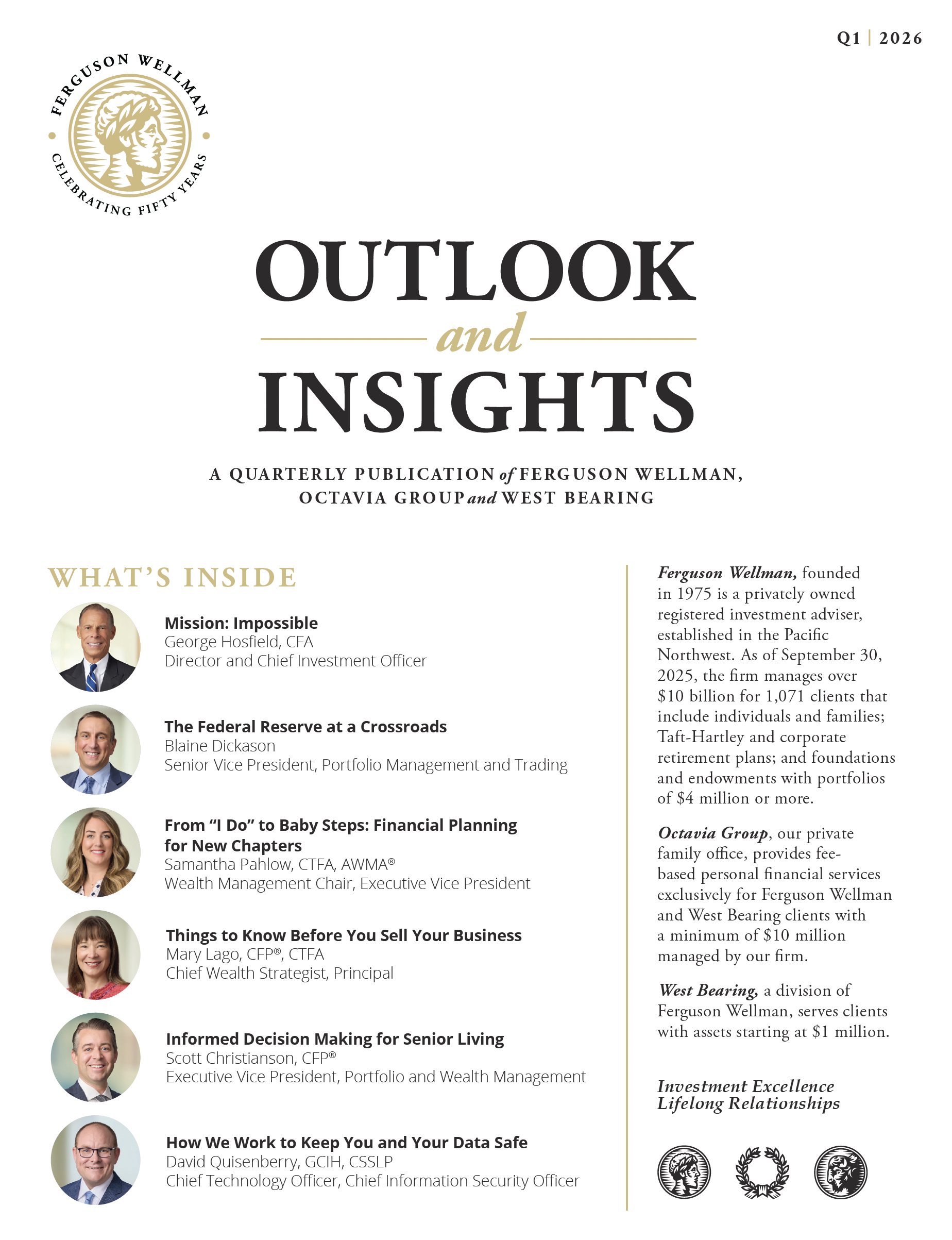communication
"TO COIN A PHRASE" Blog
News and Views from Ferguson Wellman and West Bearing Investments
Categories
weekly market makers
Our Friday recap of market activity and economic news view →
news worth noting
Ferguson Wellman and West Bearing Investments in the news and our company announcements view →
resources worth routing
Timely updates and resources from outside sources view →
our investment views
Perspective and recent allocation moves from our investment team view →
wealth management insights
Holistic planning information for individuals and families view →
It was an exceptionally busy week for economic data, and by and large, the news this week was very favorable. After a period of weakness in the second half of 2025, the labor market appears to be finding its footing.
It is a common refrain that markets hate uncertainty, and this week has delivered plenty. On both the labor front and in technology, the movers in the capital markets were driven by a combination of delayed data, softening employment signals and a sharp repricing in the stock prices of software and services companies.
Annual presentation from Ferguson Wellman sharing our views for the year regarding the global economy and capital markets, as well as a planning update from our wealth management team. The program originally aired on Wednesday, February 4, 2026.
This week, financial markets were shaped by a convergence of monetary policy continuity and rising attention to Federal Reserve leadership. At its January meeting, the Federal Reserve voted to hold interest rates steady, marking the first pause since it began easing policy in mid-2025.
Investors returned from the long weekend to something more jarring than the usual post-holiday lull: a burst of geopolitical theater that triggered the sharpest pullback in the S&P 500 since last October.
As we head into 2026, you may be navigating the year-over-year changes and asking yourself: What has changed and what should I care about? From retirement account contribution limits to rollover rules and required distributions, a few key updates are worthy of your attention.
Not too long ago, robots were mostly considered science fiction and far-fetched possibilities. Now the future that once felt distant showed up at the Consumer Electronic Show (CES) this year in Las Vegas, where companies gather to showcase their latest inventions.
2025 is officially in the books, marking the third consecutive year of double-digit gains for the market. It wasn’t just a good year for returns — it was an eventful one, too. At the start of 2025, our optimism wasn’t based solely on sentiment; the data supported it.
Ferguson Wellman Capital Management, an independent investment firm based in Portland, Oregon, has announced the acquisition of Great Northern Asset Management as of January 1, 2026. The Great Northern office will remain in downtown Vancouver, Washington. This will be Ferguson Wellman’s second office in Washington.
We participate in information sharing and threat awareness through membership in the FS-ISAC, a 25-year-old nonprofit with 5,000 financial sector members. This membership includes daily threat bulletins, participation in working groups around key areas such as AI security and fraud, and two main conferences annually for best practices and learning.
As we grow older, many of us will need to decide where to live next when our current home becomes too difficult to manage, and assistance is required. Deciding when and where to move can feel daunting, as can the various financial arrangements available to pay for the move.
Selling a business is one of the most significant decisions an entrepreneur can make. Aside from being a meaningful financial transaction, it is also a life transition that impacts your legacy, family, employees and future.
As New Year’s celebrations wrap up and 2026 begins, the U.S. economy is sending signals that are difficult to reconcile: consumer sentiment is deeply negative, yet spending remains resilient.
Two joyful milestones—marriage and the arrival of a child—bring celebration, change and financial complexity. These transitions also create important opportunities to strengthen your financial foundation and ensure that the plans you have in place evolve to support the people you love.
After serving two full terms as chairman of the Federal Reserve, Jerome Powell enters 2026 with just three Fed meetings remaining under his leadership. Beginning in June, a new Fed Chair will preside over setting monetary policy for our country. While the list of potential nominees has been fluid, a critical step in this process is that the nominee, and likely new chair, gains the confidence of a wide variety of stakeholders.
Investors had to contend with plenty of noise in 2025. Tariff uncertainty disrupted markets, the longest government shutdown in U.S. history delayed economic data and the Fed resumed its easing cycle.
This week, investors and capital markets received a dose of holiday cheer as major U.S. stock indices recorded back-to-back highs in the two days before Christmas market closures. Stronger-than-expected economic growth during the summer helped drive the momentum, offsetting fresh evidence that consumers are growing more uncertain about their economic futures.
At Ferguson Wellman, the alternative assets desk (my primary role) tends to be where the uncommon client questions land. Alternative assets, in our world, are basically anything that is not a publicly traded stock or bond, and our clients come to us with terrific questions that often sit in this "other" bucket.
Every year, we get questions about how to reduce taxes by moving out of state. Taxes in Oregon have been some of the highest in the country for many years, and Washington is quickly following suit.
The holiday season is in full swing, and there’s a certain energy in the air that feels unmistakable. Calendars fill with gatherings, homes glow a little brighter and routines soften as people pause to reflect on the year behind them. The gift lists and travel plans often involve higher spending and reveal deeper feelings among consumers.
As we look ahead to the Federal Reserve’s December 10 policy meeting, markets are pricing in a greater than 90% chance of a .25% cut in the Fed Funds rate. As my colleague Blaine Dickason wrote last week, the Fed is laser-focused on the jobs market. While this week’s labor market data points to a cooling trend, it doesn’t suggest a contraction.
Yesterday marked Jerome Powell’s last Thanksgiving as Federal Reserve Chair. While he might have much to be thankful for, this year, as he enters the final months of his chairmanship, a unified Federal Reserve is not one of them. With the next Fed meeting and a possible interest rate cut in less than two weeks, we wanted to highlight the dynamics and implications of several transitions occurring at our country’s central bank.
Coming into this week, investors were focused on two items: the release of delayed employment data and Nvidia’s earnings announcement.
As the pace of life can slow down in the fall and winter seasons, so can we find ourselves noticing the finer details that surround us. These seasons invite reflection and intentionality, making them an ideal time to turn our attention to year-end financial planning.
I spent much of last Sunday with my father in his garage, servicing my car’s rear brakes. The job was supposed to be quick as we’d done it before without much trouble. Worn-out parts come off, new ones go on.
As November begins, markets find themselves navigating unprecedented territory. The government shutdown has now stretched to 38 days, the longest in U.S. history. While Washington remains gridlocked over healthcare subsidies and spending priorities, the Federal Reserve is operating in the dark at a moment when clarity is paramount.
This past week offered a trifecta of market-moving headlines: the Federal Reserve lowering interest rates, the latest chapter in the U.S. - China trade saga and a flurry of earnings reports from the leaders in tech and AI.
The idea of an AI bubble has been the topic du jour among mainstream investment news channel commentators. It’s no surprise: AI has been the primary driver of the stock market’s rise for the third consecutive year.





















